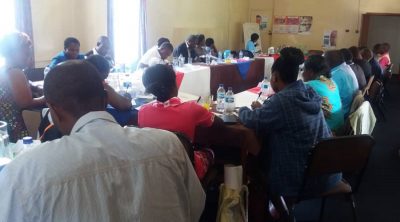Join a powerful, unprecedented alliance for better eye health for all.
Join IAPB-
Choose an alternate language here

Fear and cost were noted to be the main barriers to accessing eye health services in the Rapid Assessment of Avoidable Blindness conducted in Manicaland Province. Ophthalmic Nurses in the project operational areas have reported non-medical practices that patients attempt to use without success and ending up at health centres. These include herbal concoctions, human urine, breast milk and tomato leaves among others. Some individuals believe that visual impairment is associated with bad luck or spiritual attacks and resort to spiritual solutions. This is more-so among sects where followers are prohibited from seeking medical attention from health institutions. These challenges reflect the continued need for awareness, strong collaboration with key community members and stakeholders to fight these harmful practices and promote positive eye health seeking behaviour.
As part of the current SiB project plan and in response to these challenges, Council for the Blind through financial support from CBM joined hands with the Ministry of Health and Child Care in promoting integration of Primary Eye Care (PEC) into Primary Health Care (PHC). This was in recognition of the fact that eye health in the country had been operating as a silo service for several years and this affected reach in the communities. The beliefs, norms and practices witnessed today may equally be a result of how eye health services were once structured.
With the guidance of the MoHCC, the SiB project conducted training for 219 (20 male and 199 female) Village Health Workers (VHWs) and 32 (14 male and 18 female) Registered General Nurses from 23 clinics in Nyanga district on PEC with the aim of empowering through learning and sharing of experiences. VHWs are respected community members who are in touch and in most cases are the first health contact people before the health centre. They facilitate infiltration of eye health education in the communities to improve access to eye health services and promote good eye health practices.

In a bid to reduce cost on the patient, the project also conducts eye camps where OPNs and Ophthalmologists travel into hard to reach areas and conduct cataract surgeries for free to community members. In 2018, three eye camps were conducted in Manicaland Province and about 250 patients were assisted, the elderly being the greatest number of beneficiaries. Despite the difficult economic environment and working conditions which could be improved, the VHWs and the local nurses help to mobilize community members ahead of the eye camps making the work more effective in breaking barriers to accessing eye health services. As Zig Ziglar said, “You can have everything in life you want if you will just help enough people get what they want.” It could be this hope that the VHWs and nurses continue to hold onto as each day passes and they reach out to and save the next possible victim of avoidable blindness.
By Nancy Makande
SiB Intern (Council for the Blind)